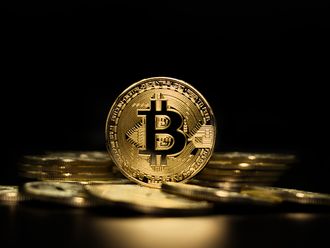London : European stocks rose last week, with the Stoxx Europe 600 Index rallying the most in 10 months, after the European Union unveiled a loan package worth almost $1 trillion (Dh3.67 trillion) to contain the region's sovereign-debt crisis.
A measure of banks in the Stoxx 600 rallied the most since August, after the biggest fall in a year a week earlier. ING Groep NV, the biggest Dutch financial-services company, surged 22 per cent while Banco Santander SA, Spain's largest lender, gained 7.9 per cent. BT Group surged 19 per cent after profit beat analysts' estimates.
The Stoxx 600 increased 4.8 per cent to 248.46 last week, the biggest advance since July 2009, as all 19 industry groups rallied.
The gauge has still retreated 8.7 per cent from this year's high on April 15, and slumped 3.4 per cent Friday, amid lingering concern that the region's debt crisis will hamper economic growth.
The bailout package "has allowed calm to return to financial markets by providing more breathing space for troubled euro zone economies to get their finances in better shape," ING's London-based economist James Knightley wrote in a report.
Tightening measures
"Individual economies are responding with Spain and Portugal announcing aggressive fiscal tightening measures, but success depends on the resolve of politicians and citizens. Consequently, confidence remains fragile."
Jolted into action by the weakening euro and soaring bond yields in Portugal and Spain, the European Union agreed to offer financial assistance to countries facing instability worth as much as 750 billion euros (Dh3,423 billion), including International Monetary Fund backing. The European Central Bank said it will counter "severe tensions" in certain markets by purchasing government and private debt and restarted a dollar- swap line with the Federal Reserve.
The euro fell to below $1.24 for the first time since November 2008 Friday on concern that the 16-nation currency may be headed for disintegration.
The shared currency recorded its fourth straight weekly drop against its US counterpart in the longest losing streak since February, as German Chancellor Angela Merkel said that Europe is in a "very, very serious situation." El Pais reported that France threatened to leave the euro during talks that led to last week's bailout.
Aides to French President Nicolas Sarkozy, German Chancellor Angela Merkel and Spanish Prime Minister Jose Luis Rodriguez Zapatero all denied the report.
Deutsche Bank AG Chief Executive Officer Josef Ackermann said Greece may not be able to repay its debt in full, arguing it would require "incredible efforts" in an interview with ZDF television.
Former Federal Reserve Chairman Paul Volcker said he's concerned that the euro area may break up after the Greek fiscal crisis that sparked an unprecedented bailout by the region's members.
"You have the great problem of a potential disintegration of the euro," Volcker said in a speech in London on May 13.
"The essential element of discipline in economic policy and in fiscal policy that was hoped for "has" so far not been rewarded in some countries."
National benchmark indexes all but one of 18 western European markets. Germany's DAX added six per cent, while the UK's FTSE 100 increased 2.7 per cent.
France's CAC-40 Index gained five per cent. Greece's ASE Index added 1.7 per cent. Spain's IBEX 35 gained three per cent.
A gauge of banks in the Stoxx 600 soared 6.7 per cent last week. HSBC Holdings, Europe's largest bank, rose 2.8 per cent while Barclays gained 9.2 per cent.
ING gained 22 per cent after returning to a profit in the first quarter. Allianz SA, Europe's biggest insurer, increased 8.6 per cent after almost quadrupling earnings in the first three months.
Ageas, formerly known as Fortis, surged 19 per cent. The insurer has reduced its holdings of southern European sovereign debt to less than 13.3 billion euros as of May 10, it said on May 12.












